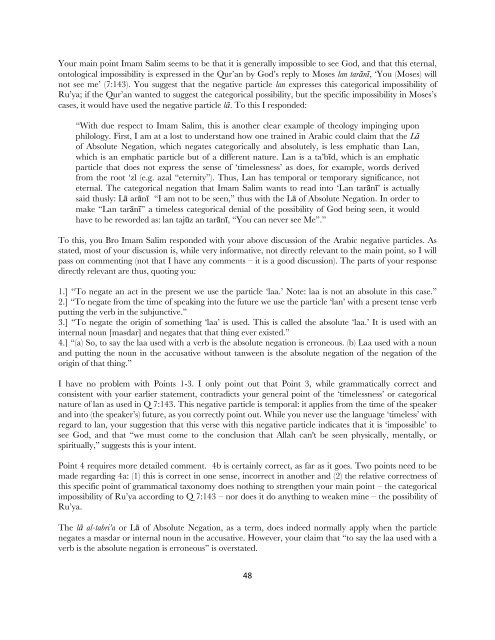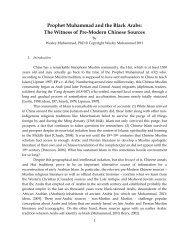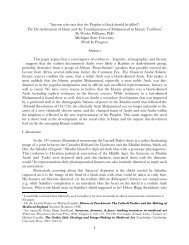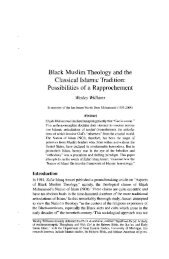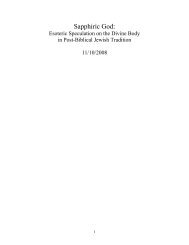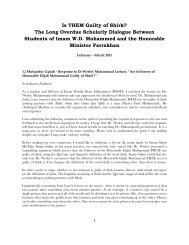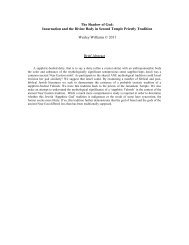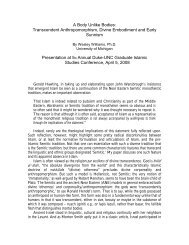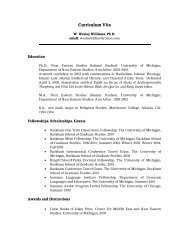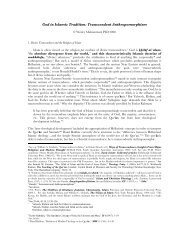Is THEM Guilty of Shirk? - Dr. Wesley Muhammad
Is THEM Guilty of Shirk? - Dr. Wesley Muhammad
Is THEM Guilty of Shirk? - Dr. Wesley Muhammad
Create successful ePaper yourself
Turn your PDF publications into a flip-book with our unique Google optimized e-Paper software.
Your main point Imam Salim seems to be that it is generally impossible to see God, and that this eternal,<br />
ontological impossibility is expressed in the Qur‘an by God‘s reply to Moses lan tarānī, ‗You (Moses) will<br />
not see me‘ (7:143). You suggest that the negative particle lan expresses this categorical impossibility <strong>of</strong><br />
Ru‘ya; if the Qur‘an wanted to suggest the categorical possibility, but the specific impossibility in Moses‘s<br />
cases, it would have used the negative particle lā. To this I responded:<br />
―With due respect to Imam Salim, this is another clear example <strong>of</strong> theology impinging upon<br />
philology. First, I am at a lost to understand how one trained in Arabic could claim that the Lā<br />
<strong>of</strong> Absolute Negation, which negates categorically and absolutely, is less emphatic than Lan,<br />
which is an emphatic particle but <strong>of</strong> a different nature. Lan is a ta‘bīd, which is an emphatic<br />
particle that does not express the sense <strong>of</strong> ‗timelessness‘ as does, for example, words derived<br />
from the root ‗zl (e.g. azal ―eternity‖). Thus, Lan has temporal or temporary significance, not<br />
eternal. The categorical negation that Imam Salim wants to read into ‗Lan tarānī‘ is actually<br />
said thusly: Lā arānī ―I am not to be seen,‖ thus with the Lā <strong>of</strong> Absolute Negation. In order to<br />
make ―Lan tarānī‖ a timeless categorical denial <strong>of</strong> the possibility <strong>of</strong> God being seen, it would<br />
have to be reworded as: lan tajūz an tarānī, ―You can never see Me‖.‖<br />
To this, you Bro Imam Salim responded with your above discussion <strong>of</strong> the Arabic negative particles. As<br />
stated, most <strong>of</strong> your discussion is, while very informative, not directly relevant to the main point, so I will<br />
pass on commenting (not that I have any comments – it is a good discussion). The parts <strong>of</strong> your response<br />
directly relevant are thus, quoting you:<br />
1.] ―To negate an act in the present we use the particle ‗laa.‘ Note: laa is not an absolute in this case.‖<br />
2.] ―To negate from the time <strong>of</strong> speaking into the future we use the particle ‗lan‘ with a present tense verb<br />
putting the verb in the subjunctive.‖<br />
3.] ―To negate the origin <strong>of</strong> something ‗laa‘ is used. This is called the absolute ‗laa.‘ It is used with an<br />
internal noun [masdar] and negates that that thing ever existed.‖<br />
4.] ―(a) So, to say the laa used with a verb is the absolute negation is erroneous. (b) Laa used with a noun<br />
and putting the noun in the accusative without tanween is the absolute negation <strong>of</strong> the negation <strong>of</strong> the<br />
origin <strong>of</strong> that thing.‖<br />
I have no problem with Points 1-3. I only point out that Point 3, while grammatically correct and<br />
consistent with your earlier statement, contradicts your general point <strong>of</strong> the ‗timelessness‘ or categorical<br />
nature <strong>of</strong> lan as used in Q 7:143. This negative particle is temporal: it applies from the time <strong>of</strong> the speaker<br />
and into (the speaker‘s) future, as you correctly point out. While you never use the language ‗timeless‘ with<br />
regard to lan, your suggestion that this verse with this negative particle indicates that it is ‗impossible‘ to<br />
see God, and that ―we must come to the conclusion that Allah can't be seen physically, mentally, or<br />
spiritually,‖ suggests this is your intent.<br />
Point 4 requires more detailed comment. 4b is certainly correct, as far as it goes. Two points need to be<br />
made regarding 4a: (1) this is correct in one sense, incorrect in another and (2) the relative correctness <strong>of</strong><br />
this specific point <strong>of</strong> grammatical taxonomy does nothing to strengthen your main point – the categorical<br />
impossibility <strong>of</strong> Ru‘ya according to Q 7:143 – nor does it do anything to weaken mine – the possibility <strong>of</strong><br />
Ru‘ya.<br />
The lā al-tabri‟a or Lā <strong>of</strong> Absolute Negation, as a term, does indeed normally apply when the particle<br />
negates a masdar or internal noun in the accusative. However, your claim that ―to say the laa used with a<br />
verb is the absolute negation is erroneous‖ is overstated.<br />
48


